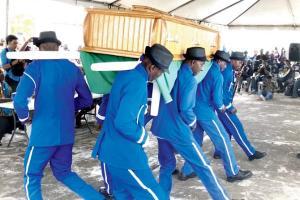For most of us, death is a tragedy, not supposed to happen. The dragomen of Suriname taught me that it was a time to party

Suriname's coffin-bearers, the dragomen, dance while they carry coffins, making death a celebration for everyone
 I'm sorry for your loss."
I'm sorry for your loss."
The surviving family members are looking sombre and grim, as one is supposed to when a dear one dies. The visitors who arrived to offer condolences in this hour of grief rearranged their faces just before ringing the doorbell. It has been four days since the death; perhaps the bereaved had moved on from denial and anger to acceptance. Perhaps they were even celebrating the life that had passed on.
ADVERTISEMENT
But you can't go wrong with a grief face at a time of bereavement. You're not sure what to say, but a short sentence — 'I'm sorry for your loss' — is known to do the job every time.
For most of the 7.5 billion people on the planet, death is bad news. Death is not supposed to happen; we're supposed to live forever. Even if we're living on a planet engulfed by fire, blood and greed, death is unwelcome. Except perhaps for suicide bombers, Buddhists and karma yogis.
For the rest of us, death is a tragedy, a time of anguish. What if you were wrong? What if death was liberation from the worst of possible fates, an open, one-way ticket to something indescribably better?
Which brings me to the annual dance of the dragomen.
I saw the announcement on a poster in the lobby of the Suriname hotel I was staying at. For those of you who missed my column two weeks back, Suriname is South America's smallest country, ruled today by people who were once its plantation slaves. The population consists of Hindus from India, Muslims from Indonesia, Christians from Ghana, as well as Chinese and animistic native Americans.
It was Sunday and the Dragomen sounded like a local hip-hop group, so I decided to check them out. Paramaribo, Suriname's capital, is a pretty sparse city, almost provincial. Following directions and walking for an hour, I found myself at a church.
Everyone was in their Sunday best, the women wearing vivid, vibrant colours and the men in bush shirts or suits. It was warm, with an unfettered sun blazing down on us from a washed blue sky. Two pretty black girls at the gate were splashing guests with Florida Water, a spicy, vivacious cologne.
The churchgoers milled about the premises but the nave was empty, apparently between sermons. No signs of any hip-hop performance. Was I in the wrong place? Surely not; I could see a big poster announcing the Dragomen's dance.
A little to the right of the entrance, under a canopy, was a disturbingly large coffin. Had someone died? Why did no one look sad?
Then my eyes fell on groups of six or so black men, seemingly in uniforms, but so outlandish that you might have considered them cartoons. One group looked like waiters, wearing ink blue trousers and button-up jackets with a white stripe on the sides, and brass buttons. Another wore florid Hawaiian shirts and Panama hats, with shaded glasses and white shoes. A third group looked like Zorros.
I was soon listening to a remarkable story.
In history, dragomen were highly literate linguists, conversant with Arabic, Persian, Turkish and several European languages, who served as translators for dignitaries. However, the dragomen of Suriname are coffin bearers. They carry the Christian dead of Suriname from their homes to burial grounds.
Each church has its own dragomen who operate almost like a guild, with their own uniform, secret language and rituals. Most of them trace their origin back to the Ghanaian slaves who had been brought in by the Dutch, so I suspect their attitude towards death might also have African roots.
People in Suriname believe that when you mourn a person's passing, you are really crying for yourself. For all you know, the deceased is in a far better place having a whale of a time. A celebration is a better response than breast-beating and wailing. Accordingly, Suriname has three days of unrestrained celebrations following a death. Then it's time to bury the body.
Six dragomen hoist the coffin, with a front runner marking pace as the procession sets off. At one point, the accompanying brass band picks up the tempo with a perky salsa and the dragomen start some nifty footwork. The band gets merrier and the dragomen finally break into a full-fledged dance, never once losing their hold on the coffin. The crowd joins in; it's party time!
At the annual dance of the dragomen that day, I watched six troupes of dragomen show off their skill at dancing while hefting a large and heavy coffin, though probably one without a dearly departed inside. The prize would go to the gang that displayed the greatest energy and the fanciest moves. I've never seen anything quite like it.
The dragomen with the ink-blue waiter jackets won.
Here, viewed from there. C Y Gopinath, in Bangkok, throws unique light and shadows on Mumbai, the city that raised him. You can reach him at cygopi@gmail.com Send your feedback to mailbag@mid-day.com
The views expressed in this column are the individual's and don't represent those of the paper
Catch up on all the latest Crime, National, International and Hatke news here. Also download the new mid-day Android and iOS apps to get latest updates
 Subscribe today by clicking the link and stay updated with the latest news!" Click here!
Subscribe today by clicking the link and stay updated with the latest news!" Click here!







